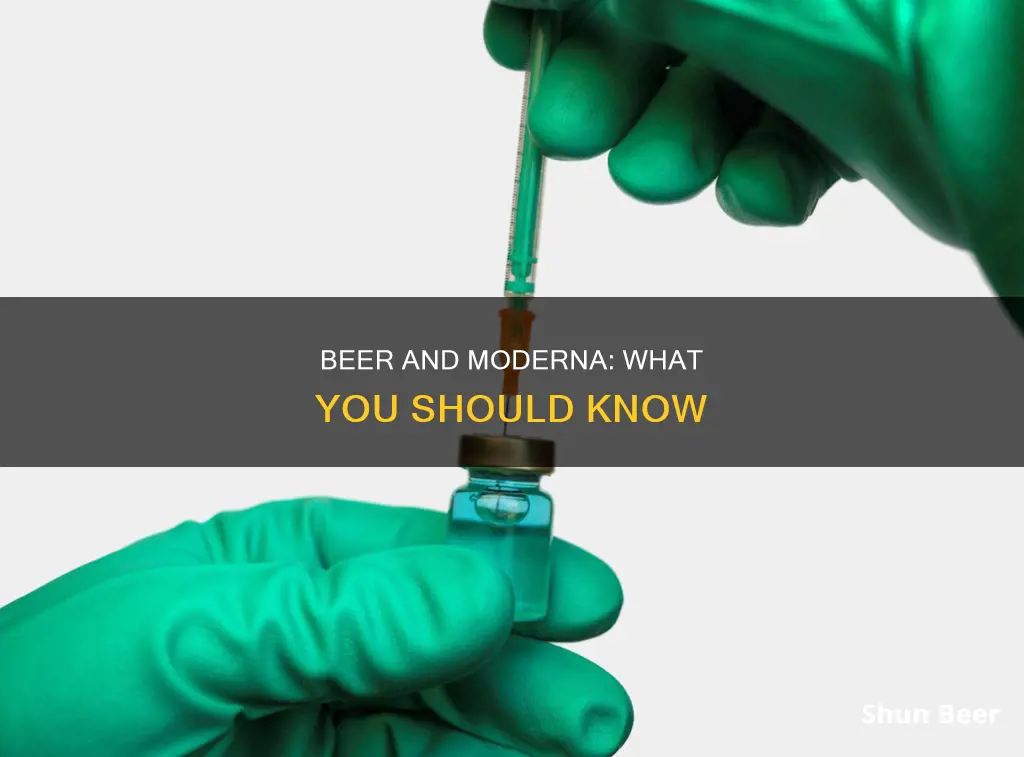
There is no official guidance on drinking alcohol after receiving the Moderna COVID-19 vaccine. However, some experts advise against drinking alcohol, especially heavily, immediately after vaccination. While there is no evidence that alcohol affects the vaccine's efficacy, it may mask side effects, and you won't know if the vaccine or alcohol is causing a reaction. Experts recommend refraining from drinking heavily during the first two weeks after receiving the shot to maintain your immune system. Moderate drinking is defined as one drink or less per day for women and two drinks per day or less for men.
Can I drink a beer after the Moderna vaccine?
| Characteristics | Values |
|---|---|
| Is there official guidance on drinking alcohol after the Moderna vaccine? | No official guidance exists on drinking alcohol after the Moderna vaccine. |
| Is it safe to drink alcohol after the Moderna vaccine? | Moderate drinking is unlikely to impair the immune response to the Moderna vaccine, but heavy drinking might. |
| What do experts advise? | Some experts advise against drinking right after getting the Moderna vaccine, especially heavy drinking. |
| What are the risks of drinking alcohol after the Moderna vaccine? | Alcohol may worsen the side effects of the Moderna vaccine, such as fatigue, headache, and nausea. Alcohol can also negatively impact the immune system and increase the risk of infection. |
What You'll Learn
- Moderate drinking is unlikely to affect the COVID-19 vaccine's efficacy
- Heavy drinking may negatively impact your immune system
- Experts advise against drinking alcohol after getting the vaccine
- Drinking alcohol may worsen the side effects of the vaccine
- Alcohol may increase the risk of complications after immunisation

Moderate drinking is unlikely to affect the COVID-19 vaccine's efficacy
There is currently no official guidance on drinking alcohol after receiving the COVID-19 vaccine or booster. However, some experts advise against drinking, especially heavy drinking, immediately after vaccination. While there is no evidence that alcohol affects the efficacy of the COVID-19 vaccine, it is important to consider its impact on the immune system and potential interactions with other medications.
In contrast, chronic and heavy alcohol use can negatively impact the immune system and increase the risk of infections. A 2021 study in Antioxidants found that binge drinking increases gut permeability, allowing toxins and bacteria to leak through the gut wall, leading to chronic inflammation. Another study in Frontiers in Psychiatry (2022) reported that binge drinkers had higher levels of pro-inflammatory compounds in their circulation.
It is worth noting that alcohol can affect females differently than males. According to the CDC, females absorb more alcohol and take longer to metabolize it, increasing the risk of long-term negative health consequences. Therefore, it is crucial to drink in moderation, especially for females.
While there is no need to avoid alcohol completely after receiving the COVID-19 vaccine, it is important to drink in moderation and be mindful of potential side effects and interactions with other medications. If you have any concerns or experience adverse side effects after vaccination, consult a healthcare professional.
Beer and Tetanus Shots: What You Need to Know
You may want to see also

Heavy drinking may negatively impact your immune system
While there is no conclusive evidence that alcohol reduces the Moderna vaccine's effectiveness, heavy drinking may negatively impact your immune system.
Heavy drinking has been shown to increase your risk of bacterial and viral infections. It can also lead to adverse immune-related health effects, such as susceptibility to pneumonia, acute respiratory stress syndrome, sepsis, alcoholic liver disease, certain cancers, and a higher incidence of postoperative complications.
Research has also found that heavy drinking can damage the white blood cells that are essential for fighting off infections. Specifically, excessive drinking can change the structure of macrophages and T-cells, which are types of white blood cells that destroy foreign particles and stimulate the production of other white blood cells.
Heavy drinking can also promote widespread inflammation throughout the body. Typically, the gut microbiome—a collection of "good bacteria" that live in your intestines—keeps inflammation at bay. However, when you drink excessively, those bacteria are destroyed, allowing inflammatory molecules called cytokines to spread.
In addition, heavy drinking can impact the cells within the airways, reducing their ability to remove mucus from the lungs and leading to a weakening of lung function over time. This can result in a higher vulnerability to serious conditions, like pneumonia, developing from common respiratory tract infections.
Overall, while there may be no direct impact on the Moderna vaccine's effectiveness, heavy drinking can impair your immune system and make you more susceptible to various health issues. It is always advisable to drink in moderation and consult a healthcare professional if you have any concerns.
Drinking Beer While Taking Cardizem and Ceftin: What's the Verdict?
You may want to see also

Experts advise against drinking alcohol after getting the vaccine
While there is no conclusive evidence that alcohol reduces the effectiveness of the Moderna vaccine, experts advise against drinking alcohol after getting the vaccine.
Firstly, it is important to note that alcohol affects the immune response. Studies show that alcohol disrupts immune pathways and can impair the body's ability to defend itself against infection. Excessive alcohol consumption increases susceptibility to immune-related conditions such as acute respiratory stress syndrome.
Although there is no official guidance on drinking alcohol after the COVID-19 vaccine, some experts advise against it, especially heavy drinking. According to Dr. Jagadeesh Reddy, an infectious disease specialist, "it is advisable to abstain or reduce alcohol intake for the first 48-72 hours after vaccination." This is because the side effects of the vaccine, such as fatigue, muscle aches, and injection site pain, may be confused with or worsened by hangover symptoms like fatigue, headache, and nausea.
Additionally, alcohol may interact with certain medications. For example, combining acetaminophen (Tylenol) and alcohol can cause liver injury.
While moderate drinking is unlikely to impair the immune response to the vaccine, heavy drinking might. Therefore, it is generally recommended to avoid alcohol for a few days after receiving the vaccine to give your body time to recover.
Beer and Swollen Feet: Is There a Connection?
You may want to see also

Drinking alcohol may worsen the side effects of the vaccine
While there is no conclusive evidence that alcohol reduces the Moderna vaccine's effectiveness, drinking alcohol may worsen the side effects of the vaccine.
The Centers for Disease Control and Prevention (CDC) defines moderate alcohol consumption as up to one drink per day for women and two for men. Drinking too much alcohol on a regular basis can inhibit your immune system and affect your body's ability to fight infection. According to the CDC, excessive alcohol consumption (15 or more drinks weekly for men and eight or more drinks weekly for women) can suppress your immune system, increasing your risk of getting sick.
Some hangover symptoms, like fatigue, headache, and nausea, may mimic or worsen the side effects of vaccines. Alcohol can also cause headaches, and so can the Moderna vaccine. Therefore, it would be wise to avoid alcohol until you see how you feel from the vaccine.
According to Dr. Ramandeep Sidhu, a board-certified vascular surgeon, "You should refrain from drinking heavily, especially during the first two weeks [after receiving the shot], to maintain your immune system."
Dr. Jagadeesh Reddy, an infectious disease specialist, advises that it is best to abstain or reduce alcohol intake for the first 48 to 72 hours after vaccination. This is the usual period when one might experience common and usually mild after-effects of vaccination, like fatigue, muscle aches, and injection site pain.
Charleston Beer Works: Closest Hotels for a Quick Pint
You may want to see also

Alcohol may increase the risk of complications after immunisation
While there is no official advice or evidence to suggest that drinking alcohol affects the Moderna vaccine's efficacy, excessive alcohol consumption can weaken your immune system and increase the risk of sickness. This is because heavy drinking can suppress the immune system and make it less able to defend itself against infection.
According to the CDC, moderate alcohol consumption is defined as one drink or fewer per day for women and two drinks or fewer per day for men. Drinking more than this on a regular basis can inhibit your immune system and affect your body's ability to fight infection. Excess alcohol consumption (15 or more drinks weekly for men and eight or more drinks weekly for women) can suppress your immune system, increasing your risk of getting sick.
Therefore, while drinking a beer after receiving the Moderna vaccine is not strictly contraindicated, it is advisable to refrain from drinking heavily, especially during the first two weeks after receiving the shot, to maintain your immune system.
Beer and Keto: What's the Verdict?
You may want to see also
Frequently asked questions
There is no official guidance on drinking alcohol after the Moderna vaccine, but some experts advise against drinking heavily right after getting vaccinated. It is best to abstain or reduce alcohol intake for the first 48-72 hours after vaccination.
Alcohol consumption affects the immune response. Studies show that alcohol disrupts immune pathways and can impair the body's ability to defend itself against infection. Chronic heavy drinking has been shown to increase the risk of bacterial and viral infections.
The Moderna vaccine can have potential short-term side effects, including fever, headache, fatigue, and pain at the injection site.







